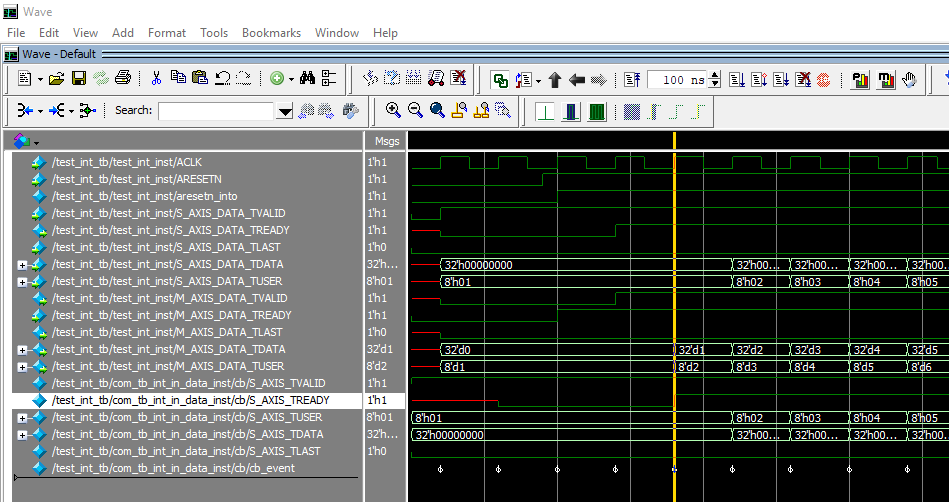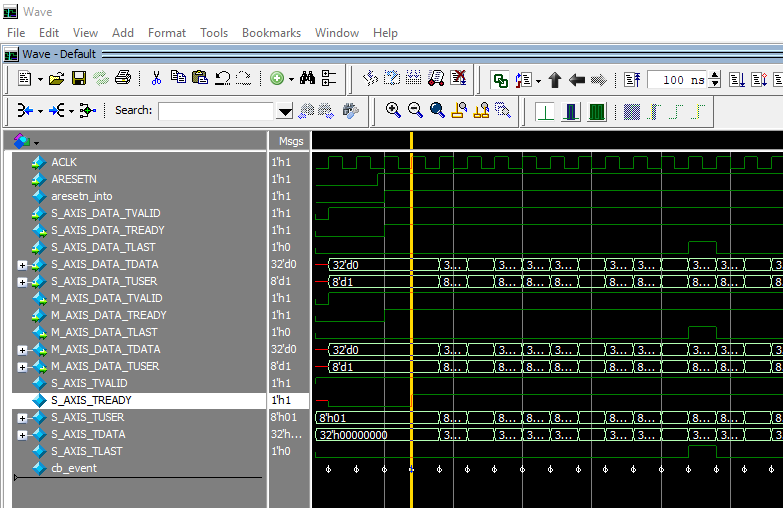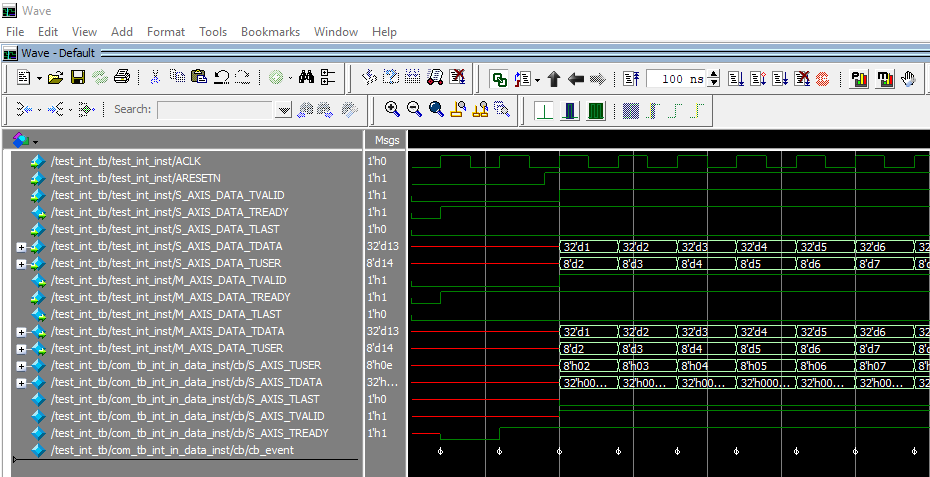Hi!
For some reasons, I have module that can’t be connected using modport:
module test_int (
// Synchro signal and reset
input logic ACLK,
input logic ARESETN,
// Interface S_AXIS_DATA
input logic S_AXIS_DATA_TVALID,
output logic S_AXIS_DATA_TREADY,
input logic S_AXIS_DATA_TLAST,
input logic [31:0] S_AXIS_DATA_TDATA,
input logic [7:0] S_AXIS_DATA_TUSER,
// Interface M_AXIS_DATA
output logic M_AXIS_DATA_TVALID,
input logic M_AXIS_DATA_TREADY,
output logic M_AXIS_DATA_TLAST,
output logic [31:0] M_AXIS_DATA_TDATA,
output logic [7:0] M_AXIS_DATA_TUSER
);
I also have a SLAVE and MASTER interfaces:
interface com_tb_int_in #(
parameter TDATA_WIDTH = 32,
parameter TUSER_WIDTH = 32
)
(
input logic ACLK,
input logic ARESETN
);
logic S_AXIS_TVALID = 0;
logic S_AXIS_TREADY;
logic S_AXIS_TLAST = 0;
logic [TDATA_WIDTH-1:0] S_AXIS_TDATA;
logic [TUSER_WIDTH-1:0] S_AXIS_TUSER;
clocking cb @(posedge ACLK);
input S_AXIS_TREADY;
output S_AXIS_TVALID;
output S_AXIS_TLAST;
output S_AXIS_TDATA;
output S_AXIS_TUSER;
endclocking
endinterface
interface com_tb_int_out #(
parameter int TDATA_WIDTH = 32,
parameter int TUSER_WIDTH = 32
)
(
input logic ACLK,
input logic ARESETN
);
logic M_AXIS_TVALID;
logic M_AXIS_TREADY = 0;
logic M_AXIS_TLAST;
logic [TDATA_WIDTH-1:0] M_AXIS_TDATA;
logic [TUSER_WIDTH-1:0] M_AXIS_TUSER;
clocking cb @(posedge ACLK);
input M_AXIS_TVALID;
output M_AXIS_TREADY;
input M_AXIS_TLAST;
input M_AXIS_TDATA;
input M_AXIS_TUSER;
endclocking
endinterface
Can I connect DUT and TB like this:
module test_int_tb (
input logic ACLK,
input logic ARESETN
);
// S_AXIS_DATA
com_tb_int_in #(
.TDATA_WIDTH (32),
.TUSER_WIDTH (8)
) com_tb_int_in_data_inst (
.ACLK (ACLK),
.ARESETN (ARESETN)
);
// M_AXIS_DATA
com_tb_int_out #(
.TDATA_WIDTH (32),
.TUSER_WIDTH (8)
) com_tb_int_out_inst (
.ACLK (ACLK),
.ARESETN (ARESETN)
);
// module test_int instantiation
test_int test_int_inst (
// Synchro signals and reset
.ACLK (ACLK),
.ARESETN (ARESETN),
// Interface S_AXIS_DATA
.S_AXIS_DATA_TVALID (com_tb_int_in_data_inst.cb.S_AXIS_TVALID),
.S_AXIS_DATA_TREADY (com_tb_int_in_data_inst.cb.S_AXIS_TREADY),
.S_AXIS_DATA_TLAST (com_tb_int_in_data_inst.cb.S_AXIS_TLAST),
.S_AXIS_DATA_TDATA (com_tb_int_in_data_inst.cb.S_AXIS_TDATA),
.S_AXIS_DATA_TUSER (com_tb_int_in_data_inst.cb.S_AXIS_TUSER),
// Interface M_AXIS_DATA
.M_AXIS_DATA_TVALID (com_tb_int_out_inst.cb.M_AXIS_TVALID),
.M_AXIS_DATA_TLAST (com_tb_int_out_inst.cb.M_AXIS_TLAST),
.M_AXIS_DATA_TREADY (com_tb_int_out_inst.cb.M_AXIS_TREADY),
.M_AXIS_DATA_TDATA (com_tb_int_out_inst.cb.M_AXIS_TDATA),
.M_AXIS_DATA_TUSER (com_tb_int_out_inst.cb.M_AXIS_TUSER)
);
endmodule




